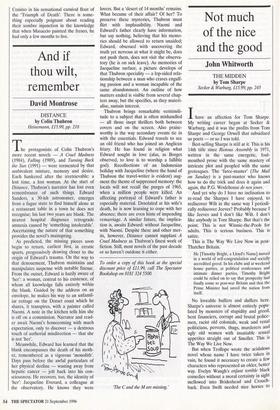And if thou wilt, remember
David Montrose
DISTANCE by Colin Thubron Heinemann, f15.99, pp. 218
The protagonists of Colin Thubron's more recent novels — A Cruel Madness (1984), Falling (1989), and Turning Back the Sun (1991) — were tormented by that ambivalent mixture, memory and desire. Each hankered after the irretrievable: a lost time, a lost woman. At the start of Distance, Thubron's narrator has lost even remembrance of such things. Edward Sanders, a 30-ish astronomer, emerges from a fugue state to find himself alone at a restaurant table in a town he does not recognise; his last two years are blank. The nearest hospital diagnoses retrograde amnesia caused by 'something intolerable'. Ascertaining the nature of that something provides the novel's mainspring.
As predicted, the missing pieces soon begin to return, earliest first, in erratic spurts, progressively drawing closer to the origin of Edward's trauma. On the way to that denouement, Thubron maintains and manipulates suspense with notable finesse. From the outset, Edward is hazily aware of 'her': a woman, central to his existence, of whom all knowledge falls entirely within the blank. Guided by the address on an envelope, he makes his way to an unfamil- iar cottage on the Dorset coast which he shares, it transpires, with a painter called Naomi. A note in the kitchen tells him she is off on a commission. Narrator and read- er await Naomi's homecoming with much expectation, only to discover — a dextrous touch of authorial misdirection — that she is not 'her'.
Meanwhile, Edward has learned that the blank encompasses the death of his moth- er, remembered as a vigorous 'monolith'. Days pass before the awful particulars of her physical decline — wasting away from hepatic cancer — jolt back into his con- sciousness. He recovers, too, the identity of 'her': Jacqueline Everard, a colleague at the observatory. He knows they were lovers. But a 'desert of 14 months' remains. What became of their affair? Of her? To preserve these mysteries, Thubron must flirt with implausibility. Naomi and Edward's father clearly have information, but say nothing, believing that his memo- ries should be allowed to return unaided; Edward, obsessed with uncovering the truth yet nervous at what it might be, does not push them, does not visit the observa- tory (he is on sick leave). As memories of Jacqueline surface, a picture develops of that Thubron speciality — a lop-sided rela- tionship between a man who craves engulf- ing passion and a woman incapable of the same abandonment. An outline of how matters ended is visible from several chap- ters away, but the specifics, as they materi- alise, sustain interest.
Thubron brings remarkable verisimili- tude to a subject that is often mishandled — all those inept thrillers both between covers and on the screen. Also praise- worthy is the way secondary events tie in with the essentials. Edward travels to see an old friend who has joined an Anglican friary. He has found in religion what Edward sought in love (alas, as Borges observed, to love is to worship a fallible god). Recollections of an Indonesian holiday with Jacqueline (where the hand of Thubron the travel-writer is evident) aug- ment the theme of suppressed memory: the locals will not recall the purges of 1965, when a million people were killed. An affecting portrayal of Edward's father is especially material. Desolated at his wife's death, he is now learning to cope with her absence; there are even hints of impending remarriage. A similar future, the implica- tion is, awaits Edward: without Jacqueline, with Naomi. Despite these and other mer- its, however, Distance cannot supplant A Cruel Madness as Thubron's finest work of fiction. Still, most novels of the past decade or so haven't outdone it either.
To order a copy of this book at the special discount price of £11.99, call The Spectator Bookshop on 0181 324 5500.
'The C and the M are missing.'


















































































 Previous page
Previous page